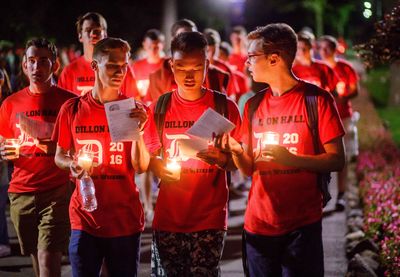Community Life

Life in a residence hall is particularly distinctive because of the extraordinary formation that happens by virtue of the rich foundation and framework it offers to all students who experience it, especially in the areas of community building, leadership development, and faith and human formation.
Living in community supports students’ formation as they deepen their faith, cultivate moral virtues, develop healthy relationships, become servant leaders, and reflectively and prayerfully discern their future. Importantly, students’ participation in hall life prepares them for their life beyond the University – a reference point for how to form Christian community in their future pursuits and lasting friendships to sustain and support them through life’s journey.
The single-sex, mixed-class, stay-hall system featuring modest-sized halls are critical elements of the residential model as is student participation in the halls. In fact, the model flourishes when members of each class year are active participants in the hall, with upperclassmen poised to model servant leadership and character formation and underclassmen benefiting from the guidance of their peers in preparation to pass on their knowledge in the years ahead.
In their first year, students are able to discover their identity and a sense of belonging by living in a welcoming and inclusive hall community on campus.Residence halls are a “point of entry” for introduction into the broader University culture, and first-year students (all of whom will receive an on-campus assignment) are required to live on campus in residence halls with at least one randomly assigned roommate, and are not permitted to change roommates or transfer halls during their first year. This practice encourages first-year students to develop a shared sense of responsibility and to cultivate a capacity to live with people of all backgrounds. It also helps students to develop points of connection within their residence hall; to utilize support, help, and resources for themselves and others by consulting with hall staff; to resolve differences; to demonstrate ownership and accountability for their behavior; and to grow as active participants in Christian community. As such, first-year students may not request to live in, and are not allowed to transfer into, single rooms. Students with accommodation needs, however, can receive consideration in their housing assignment as it relates their approved accommodation from Sara Bea Accessibility Services.
As students progress in their undergraduate years, their experience in the halls matures along with them. Consistent with the continued formation created in residential life, sophomores and juniors, beginning with the incoming class of 2018, are required to live on campus. These students can make more choices about their living arrangements, and can select their roommate(s) along with the rooms and sections where they live. Students can also decide to transfer to another hall through the Hall Transfer process. Upper-class students demonstrate increased emotional maturity and a generosity of spirit toward others and society, which lends itself to meaningful service to the Church and the world. Their gifts, talents, and interests evolve as they take their place as leaders and participants in hall and campus culture, and they continue to benefit from the shared experience of community within the hall, solidifying friendships, supporting fellow residents, and growing in faith and virtue.
Seniors are a treasured asset in each residence hall, and are trusted and respected leaders on campus as a whole. Several hall leadership roles are available exclusively to these seasoned students, including resident assistants. The mentorship and wisdom seniors offer to their peers is invaluable, and this year offers them the opportunity to savor their last year living among friends who will last a lifetime.